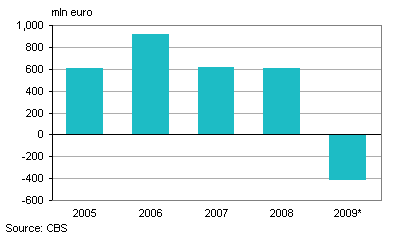Municipalities lost money on building land in 2009

Dutch municipalities suffered total losses of 414 million euro on building land in 2009. They also had deficits in most other policy areas. As a result of the one-off revenues from the sale of shares in energy companies Nuon and Essent, they did manage to close the 2009 books with a positive balance, however.
Lower revenues from land sales
For many years the development of building land had been an important source of income for municipalities. This trend was interrupted in 2009, however. The balance of costs and revenues on land development was negative (-414 million euro) and was more than 1 billion euro lower than in 2008. This was mainly caused by the substantially lower revenues from land sales as a result of the economic crisis.
Because of the disappointing revenues, municipalities adjusted their expectations downwards. While the municipal budgets for 2009 foresaw an income of 543 million euro from building land development, the amounts were reduced to 371 million for 2010 and 41 million for 2011.
Balance of costs of and revenues from development of building land by municipalities

Deficits mostly for large municipalities
The municipality of Utrecht had the largest negative balance (-62 million euro) on building land in 2009, followed by The Hague (-42 million euro). Losses were also substantial in Arnhem, Breda and Rotterdam.
Of the four largest cities - Amsterdam, Rotterdam, The Hague and Utrecht - only Amsterdam had a positive balance. The net operating result in Amsterdam was 86 million euro lower than in 2008 though, when the nation’s capital still made half a billion euro from preparing, selling and leasing out land.
Balance of costs of and revenues from development of building land, by municipality, 2009*

Most policy areas in the red
Municipalities spent more money than they received in most policy areas in 2009. The largest deficit, 6.4 billion euro, was for social provisions and social services. The deficits were largely covered from the general reserves, such as income from municipal taxes, and funds from central government, which rose by nearly 10 percent in 2009.
In spite of the setbacks, municipalities were able to close 2009 with a positive balance of 4.3 billion euro. This was mainly as a result of the one-off revenues from the sale of shares in energy companies Essent and Nuon by a number of municipalities, which generated around 5.7 billion euro.
Balance of costs of and revenues of municipalities, by policy area, 2009*

Marten Jan van Rijn